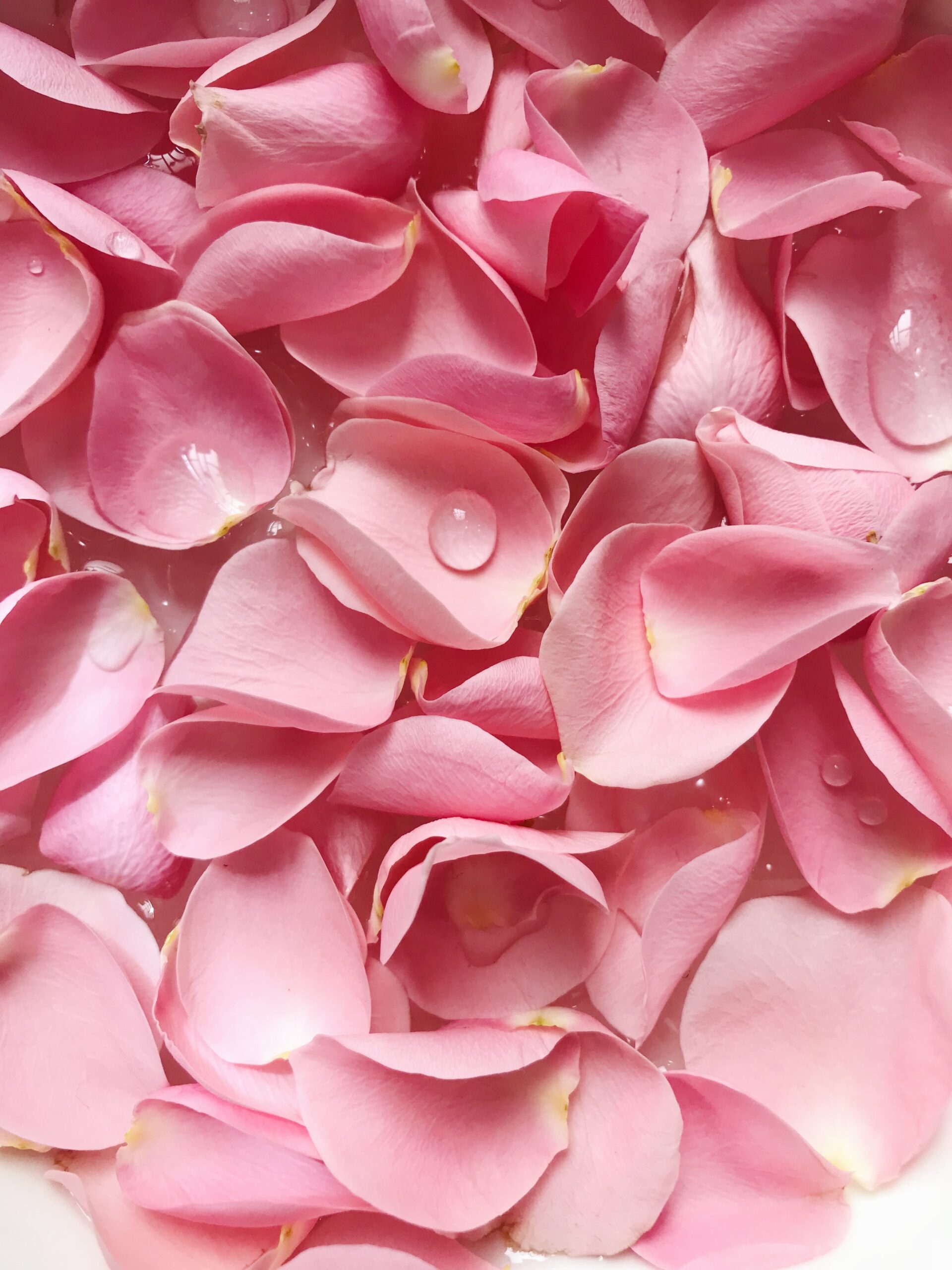Known for generations as hydrosol or floral water, rose water is a real beauty asset for all ages. Beyond its sweet intoxicating fragrance, it has real moisturizing, anti-aging, protective, purifying, healing, anti-inflammatory, refreshing and relaxing properties. Let’s discover together the many qualities and the use of the flower of love hydrosol on the skin and hair.
What are its main beauty benefits?
Rose water has many beauty benefits, both for the skin and for the hair. It has the following properties.
Hydrating, toning and illuminating
Rose water promotes radiance, awakens, smoothes, tones and illuminates the complexion and also acts on the hydration and revitalization of the skin.
Purifying, astringent
Rose water helps to gently purify even sensitive skin and is an astringent, purifying and balancing asset for combination to oily or acne-prone skin, especially when used in the morning on clean skin and/or in the evening after a make-up removal and skin cleansing.
Anti-inflammatory, antibacterial and soothing
Its composition rich in vitamins and polyphenols gives it effective anti-inflammatory properties on acne, skin irritations, scalp inflammation and dry dandruff. Spray on the skin or the scalp then massage gently, the relief is often immediate.
Healing, calming and regenerating
By its softness, rose water helps to calm itching, irritation and redness (eczema, rosacea, psoriasis, etc.) as well as to regenerate very dry or scaly skin. Its healing action greatly helps to reduce acne, acne spots or recent scars. It also soothes skin reddened by the sun.
Anti-aging and protective
By its richness in essential fatty acids and antioxidants, rose water helps protect the skin from the deleterious effects of free radicals and therefore fights against premature skin aging. Its action helps to maintain an optimal concentration and quality of cutaneous collagen and thus promotes elasticity, resistance, the « plumped skin » effect and masks wrinkles.
Refreshing and decongestant
Rose water is excellent for puffy skin and eyes, dark circles and bags under the eyes, eye irritations. This decongestant and refreshing effect is all the more effective when the water is used as it comes out of the fridge.
Olfacto-therapeutic
The subtle, intoxicating, delicate and characteristic scent of the rose gives its floral water a soothing, relaxing, positive and emotional harmonizing power. Outer beauty also lives on the inside. Rose water can also help flavor your home care and cosmetics (as well as your favorite drinks and desserts).
What is rose water and what is its composition?
Rose hydrosol is the result of a distillation process by steam distillation.
The rose petals are placed in a still and distilled with spring water. From this vapor will result two precious liquids:
- hydrosol (or floral water);
- essential oil.
Focus on the hydrosol
The hydrosol has the same virtues as the essential oil but less powerful since its concentration of active molecules is lower. The concentration of aromatic molecules varies from one hydrosol to another depending on the quantity of flower per liter of water during its distillation.
Many varieties of roses can be used for hydrosol but the most common are: Damask rose and Rosa Centifolia (« hundred leaves »). They are now cultivated all over the world and mainly in Turkey, Morocco, Bulgaria, Iran and of course in Syria.
It is important to choose an organic hydrosol, from organic roses grown without pesticides, to favor the quality of its benefits.
Rose water is essentially composed of:
- vitamins A, B, C and E;
- rose oil (about 10%) rich in essential fatty acids;
- polyphenols (terpenes, anthocyanins, flavonoids);
- of glycosides.
How to use rose water? What are its contraindications?
Use of rose water
Rose water can be used alone on the skin, vaporized or applied with a cotton ball to the face and neck as a toner or after removing make-up and cleansing the skin, to perfect them. .
Sprayed on a clay mask, rose water helps rehydrate it during application. Applied to the scalp in massage it soothes irritations and stimulates blood circulation and therefore promotes hair growth, strength and health.
It can be added (in aqueous phase) in creams, masks, make-up removers, body milks or even in the bath to perfume and deploy its properties. Finally, for its olfacto-therapeutic virtues, it can be added to a fogger, an ambient mist or a diffuser without heat.
Contraindications of rose water
Rose water has few contraindications, apart from some of its components which can irritate very sensitive skin. It is therefore recommended to test the rose water on a small area of the skin before using it.
- bridge
- Allergies (overview)
- Achluophobia : all about the fear of the dark
- At what age can you do bodybuilding?
- Fatigue in the morning: causes and remedies
How to choose, buy and store your rose water?
As stated a little above, it is important to favor 100% pure and organic rose water , from flowers grown without pesticides or other chemicals, which would still be found in the final composition of the hydrosol. The mention 100% pure must appear in order to avoid mixtures of water and alcohol types mixed with a few drops of rose essential oil.
It can therefore be purchased in an organic store, in a pharmacy, from a small organic producer or on the internet, taking care of the origin. It costs around €15 per litre.
It is perfectly possible to make it at home (see the recipe below).
Rose water should ideally be stored in an anti-UV bottle, away from light, preferably in a cool place, and should be consumed within approximately two months after opening.
Recipes and synergies
Recipe to make your rose floral water:
- 100g rose petals (organic);
- 25cl of spring water or distilled water.
Boil the water then pour it over the previously cleaned petals, in a closed glass container with an airtight lid. Leave to infuse then cool for a few hours. Filter through natural gauze then store in an anti-UV bottle (blue) and in the fridge. Note the date of manufacture on the bottle.
Some synergy ideas:
- irritations, redness: oily macerate of calendula, Italian Helicryse or chamomile, Aloe Vera, essential oil of lavender;
- dull complexion: organic honey, pink clay, oily carrot macerate, orange blossom hydrosol;
- dry, reactive skin: borage, calendula, evening primrose or rosehip oil, orange blossom, cistus, lavender or lime blossom hydrosol, cistus essential oil;
- acne: aloe vera, Tea Tree hydrosol, nigella oil, green clay;
- anti-wrinkle action: borage, evening primrose, argan or rosehip oil, essential oil of Geranium or Ho wood, cistus hydrosol, honey.

